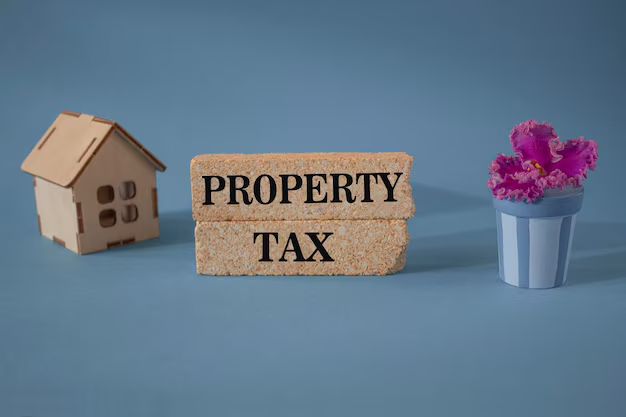Understanding Property Taxes: Where Your Money Goes
Property taxes are a fundamental part of home ownership and real estate investment. While many property owners see it as a financial burden, understanding what property taxes pay for can add a layer of appreciation for the services and infrastructure you benefit from daily. This knowledge not only makes paying taxes feel more purposeful but can also enhance your financial planning and decision-making. Let's delve deep into what property taxes fund and why they matter to your community and lifestyle.
🏢 The Essentials of Property Taxes
What Are Property Taxes?
Property taxes are levies imposed on real estate by the government to fund public services. They are calculated based on the assessed value of the property, which often considers the land and any buildings or structures attached to it. The amount can vary significantly depending on the location, property's value, and local government policies.
How Are Property Tax Rates Determined?
Local governments set tax rates based on budgetary needs, and these rates can vary widely. Typically, local authorities conduct assessments to determine property values, which then feed into the calculation of taxes owed. The formula generally involves multiplying the property's assessed value by the tax rate. Tax rates fluctuate based on the financial needs of the jurisdiction and comprehensive services provided.
Why Do We Pay Property Taxes?
Property taxes are crucial for maintaining and developing essential community infrastructure. They ensure that local governments can provide services that improve the quality of life for residents, support education, and maintain safety and health standards.
🍎 Education: A Top Destination for Property Taxes
Funding Local Schools
One of the most significant portions of property tax revenue goes towards funding public education. This includes paying for teacher salaries, funding extracurricular activities, maintaining school buildings, and providing classroom supplies. Effective educational funding helps maintain quality learning environments and contributes to societal advancement by fostering educated future generations.
Beyond the Classroom
Apart from teachers and textbooks, property taxes can also support libraries and community colleges, ensuring broader educational opportunities and resources for residents of all ages. These institutions are pivotal in providing lifelong learning and community engagement opportunities.
🚓 Protecting and Serving: Public Safety and Property Taxes
Police and Fire Departments
Another vital area funded by property taxes is public safety, which includes police and fire departments. These entities ensure that communities remain safe and well-protected from potential threats.
Emergency Services and Health
Beyond the visible presence of police officers or fire trucks, property taxes also cover emergency services such as ambulance and paramedic teams. Public health funds could also be drawn from property tax revenue, enhancing community clinics and health outreach programs.
🛣️ Infrastructure and Transportation
Building and Maintaining Roads
Property taxes are a principal source for maintaining and improving roadways, bridges, and public transportation systems. Proper infrastructure is critical for ensuring safe and efficient transportation for both personal and commercial purposes.
Public Transit
Subsidies for public transportation systems often come from property tax revenue. This helps keep public transit fares affordable while ensuring the system's sustainability and expansion when necessary.
🌳 Parks, Recreation, and Community Spaces
Maintaining Public Parks
Property taxes support the maintenance and expansion of public parks, providing spaces for relaxation, exercise, and community events. Well-maintained parks contribute to the overall physical health and well-being of a community.
Recreational Facilities
Community centers, swimming pools, and sports facilities often rely on property tax funding. These recreational facilities are vital for promoting an active lifestyle and fostering community engagement and connectivity.
🏠 Community Development and Housing
Affordable Housing
Some jurisdictions allocate a portion of property tax revenues to support affordable housing projects. This effort is essential in helping reduce homelessness and ensuring that all community members have access to stable living conditions.
Urban Planning
Property tax revenues are instrumental in urban planning and development. They ensure sustainable city growth, planning efficient land use, and protecting essential green spaces amidst expanding urban areas.
🔧 Local Government Operations
Administrative Functions
Operating a local government demands considerable resources. Property taxes fund city council operations, municipal courts, and other administrative functions essential for managing a city's daily activities.
Utilities and Public Services
Funding from property taxes also supports utilities like water and sewage management, ensuring residents have access to these fundamental services consistently and reliably.
🔑 Key Takeaways: Where Does Your Money Go?
A detailed understanding of property taxes highlights the essential services and infrastructure your dollars support, reinforcing their purpose and impact. Here's a quick summary for your convenience:
- Education: Subsidizes public schools, colleges, and libraries
- Public Safety: Funds police, fire, and emergency services
- Infrastructure: Covers roads, bridges, and transportation
- Parks and Recreation: Maintains parks and recreational facilities
- Community Development: Supports housing projects and urban planning
- Utilities: Ensures access to water, sewage, and other essential services
- Local Government: Facilitates city administrative operations
✨ Empowering Financial Awareness
Understanding the allocation of property tax revenues can empower homeowners and investors to make informed decisions about real estate and community engagement. It also encourages participation in local government discussions and decisions, enhancing the quality of services that directly impact daily life.
By recognizing the broad scope property taxes cover, individuals can appreciate the critical role these funds play in fostering community development, sustainability, and general welfare. Balancing property well-being with an understanding of where taxes contribute elevates both personal financial literacy and civic responsibility.

Related Topics
- Are Property Taxes Tax Deductible
- Can I Get a Property Tax Refund
- Can I Pay Property Tax Online
- Can I Pay Property Tax With Credit Card
- Can Property Tax And Condo Fee Be Deducted In Maryland
- Can You Claim Property Taxes On Your Income Tax
- Can You Claim Property Taxes On Your Tax Return
- Can You Claim Your Property Taxes On Your Income Tax
- Can You Pay Property Tax Monthly
- Can You Totally Not Pay Property Tax Texas
